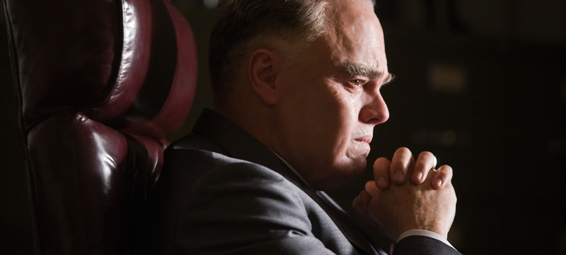John Edgar Hoover was director of the Federal Bureau of Investigation during six presidents, three wars, a great depression, and the height of organized crime. In many ways, his life story runs alongside the story of the United States during the twentieth century. Yet in his new bio pic, J. Edgar, about the mercurial man who rose to head the F.B.I.’s predecessor agency when he was just 29 years old, director Clint Eastwood lets history rattle around in the background, while his camera firmly focuses on J. Edgar Hoover the man.
Hoover’s own life is less cut and dry than the history that surrounded him. There were always rumors that he was a closet homosexual and a cross dresser. He was ambitious and suspicious. He kept secret files on prominent politicians and people in positions of power as a way of securing his own influence. He lived with his mother until her death; he allegedly rang up gambling debts. Eastwood’s J. Edgar touches on most of the controversy with soft swipes, carefully building a character who is both admirable and pathetic, strained and likable. Written by Dustin Lance Black (Milk), J. Edgar’s Hoover is a man who suffers himself, his ambition, his talent, his paranoia, his sexuality, and his loneliness. And like all good biographies, Eastwood’s movie takes a historical character and weaves him into a drama driven by its subject’s essential pathos.
Hoover is played by Leonardo DiCaprio, whose boyish glean is often hidden under layers of thick makeup. The story unfolds in flashbacks, beginning with the aged Hoover near the end of his career orating memoirs to a series of young clerks. This parallel structure allows Eastwood a narrative form that can condense a great deal of historical time into two plus movie hours.Hoover’s career launches amidst a flurry of Communist anxiety, as the radical party bombs a number of homes in Washington D.C. and across the country. Hoover, a young deputy, is instrumental in organizing raids that both round up and deport dozens of suspected communists and manage to get most of the Bureau of Investigations sacked due to the ensuing controversy. The running theme throughout Hoover’s life is power or the lack thereof, as the young investigator oversteps his bounds to achieve his ends. When the department is reorganized as the F.B.I., Hoover is chosen as its director, a position he accepts only under the conditions that he will have the authority and leeway to execute the law in the ways he sees fit.
Some of the textbook data about Hoover runs through the background of J.Edgar. There is the work he did in advancing forensic science, his role in the Lindbergh baby kidnapping case, and the ways he orchestrated his own popular myth by feeding hyperbolic stories about gangster busts to comic book publishers. But J. Edgar is, at its heart, a love story. Throughout his long career as head of the F.B.I., Hoover’s number two was Clyde Tolson, played by Armie Hammer (The Social Network). To the public, the pair’s relationship was ambiguous, but in Eastwood’s movie it becomes a decade-long romance of strained affections, only ever manifesting itself physically in one night’s heated, angry tussle. Hoover and Tolson’s relationship is one of deep friendship, platonic trust, and mutual affection. What keeps it caged are Hoover’s own misgivings over his homosexual tendencies. We do see Hoover wear a dress during a few moments in the film, moments that are always driven by despair and the powerful man’s inner fragility.
J. Edgar’s great strength as a film comes from its own restraint. It is a story that transcends its high profile central figure by focusing not on historical rights and wrongs but on the way desire, ambition, and sense of self fuel and confine our own longings. As Hoover, DiCaprio delivers a performance driven by his twinkling eyes, and yet DiCaprio’s charm is not employed as a romantic force, but as a kind of inner sympathy that keeps us engaged with a man so difficult to like. The actor is remarkably controlled and contained throughout, he broils and yearns from the inside out. DiCaprio’s performance displays marathon endurance; he makes numerous speeches in an adopted Hoover accent that aren’t just lengthy, the words contain the movie’s dramatic meat. DiCaprio will surely be spoken about at Oscar time.
The performances in J. Edgar weaken as you spin outwards from the central gravity of Hoover’s powerful presence. Hammer’s Tolson feels, at times, stoically one dimensional — hampered by prosthetics that are less agile than DiCaprio’s masterfully executed makeup. Likewise, the relationship between Hoover and his mother (Judi Dench) is emotional rendered, yet it plays like a Freudian cliché – an idea meant to inform our understanding of a character set in play on stage. Amidst this, J. Edgar can feel like a one man show, and perhaps with a little script scrubbing, it could be. The movie is most fascinating when filtered through the brilliant ego of J. Edgar Hoover, and not because of sensation or intrigue or romance, but because what ultimately fuels the character is an anxiety both grand and common, the conflict between who we think we are and how we are remembered.






